Overview
Understanding and defining a clear business purpose is not just a strategy; it’s a vital cornerstone for organizational success. We recognize how crucial it is for stakeholders to unite towards common goals, as this alignment significantly enhances employee engagement and fosters customer loyalty.
Have you ever wondered how a strong mission can transform a workplace? Look at companies like Patagonia and Unilever. Their commitment to a powerful mission has not only cultivated a dedicated workforce but has also driven impressive financial performance. This approach ultimately leads to a sustainable competitive advantage, demonstrating that when employees feel connected to a purpose, they thrive.
You are not alone in seeking this kind of transformation; many organizations are on this journey, and the rewards are profound.
Introduction
In a time when the corporate world is changing so quickly, we understand how crucial it is to have a clear business purpose. It’s not just about making profits anymore; organizations are beginning to see that their core values, mission, and vision are essential in shaping their identity and connecting with stakeholders. Companies like Patagonia and TOMS show us that when purpose is woven into their operations, it resonates deeply with customers and nurtures employee engagement and loyalty.
As we face the pressing need for reskilling and a heightened focus on sustainability, you might be wondering how to navigate these complexities. You are not alone in this journey. This article explores the multifaceted role of business purpose in driving organizational success. We’ll discuss how it not only enhances performance but also cultivates a positive work environment, positioning companies for long-term growth in an increasingly competitive marketplace. Together, let’s delve into these insights and empower your path forward.
Defining Business Purpose: The Foundation of Organizational Success
The business purpose is the heartfelt reason a company exists beyond merely pursuing profit. It encompasses the values, mission, and vision that nurture a company’s operations and strategic decisions. As we approach 2025, having a clear organizational aim is essential for success. This clarity not only shapes the identity of the organization but also unites stakeholders—including staff, customers, and investors—toward shared objectives.
Consider companies like Patagonia, which have beautifully woven environmental sustainability into their primary mission. This commitment resonates profoundly with their clientele and guides their operational practices. Such alignment fosters a strong sense of belonging and dedication among staff, ultimately enhancing organizational effectiveness.
At Find Your Career 2.0, we understand the challenges you face. We empower clients to reach their potential through education, awareness, and discovery, helping them navigate career obstacles and build trusting relationships that foster personal and financial growth. Our unique consulting services focus on guiding career transitions through the complexities of change, including strategies for credit repair and financial planning. Recent studies highlight the significance of business objectives, showing that entities incorporating sustainability into their strategies not only lower their environmental footprint but also improve transparency and trust among stakeholders.
As the workforce evolves, it is projected that by 2030, 1 billion people worldwide will require reskilling. Yet, only 17% of companies are currently investing in developing the skills of their staff. This gap emphasizes the need for companies to clearly articulate their business purpose. By doing so, they can encourage investment in employee development and promote a culture of ongoing enhancement. Moreover, the approval rates for conventional banks for small enterprise loan applications stand at 58%, illustrating the financial obstacles organizations may encounter in pursuing their goals.
The influence of a strong business mission extends to organizational identity and stakeholder alignment. Businesses with a distinct objective are better equipped to handle challenges and adapt to evolving market conditions. For example, the rise of telehealth services from 5% prior to the pandemic to 25% in 2022 demonstrates how entities that adjust their aims can address emerging needs effectively.
As Emma Mitchell, a writer, wisely observes, “A larger team doesn’t always result in improved performance,” underscoring the importance of intention in guiding team dynamics and effectiveness. As industry leaders increasingly recognize the significance of intent, their insights reflect a growing consensus: a clearly articulated organizational intent is not merely a statement but a strategic resource that can propel entities toward sustained success. Furthermore, financing alternatives provided by the U.S. Small Administration can further assist small enterprises in achieving their specified goals, enhancing their resilience and capacity for growth.
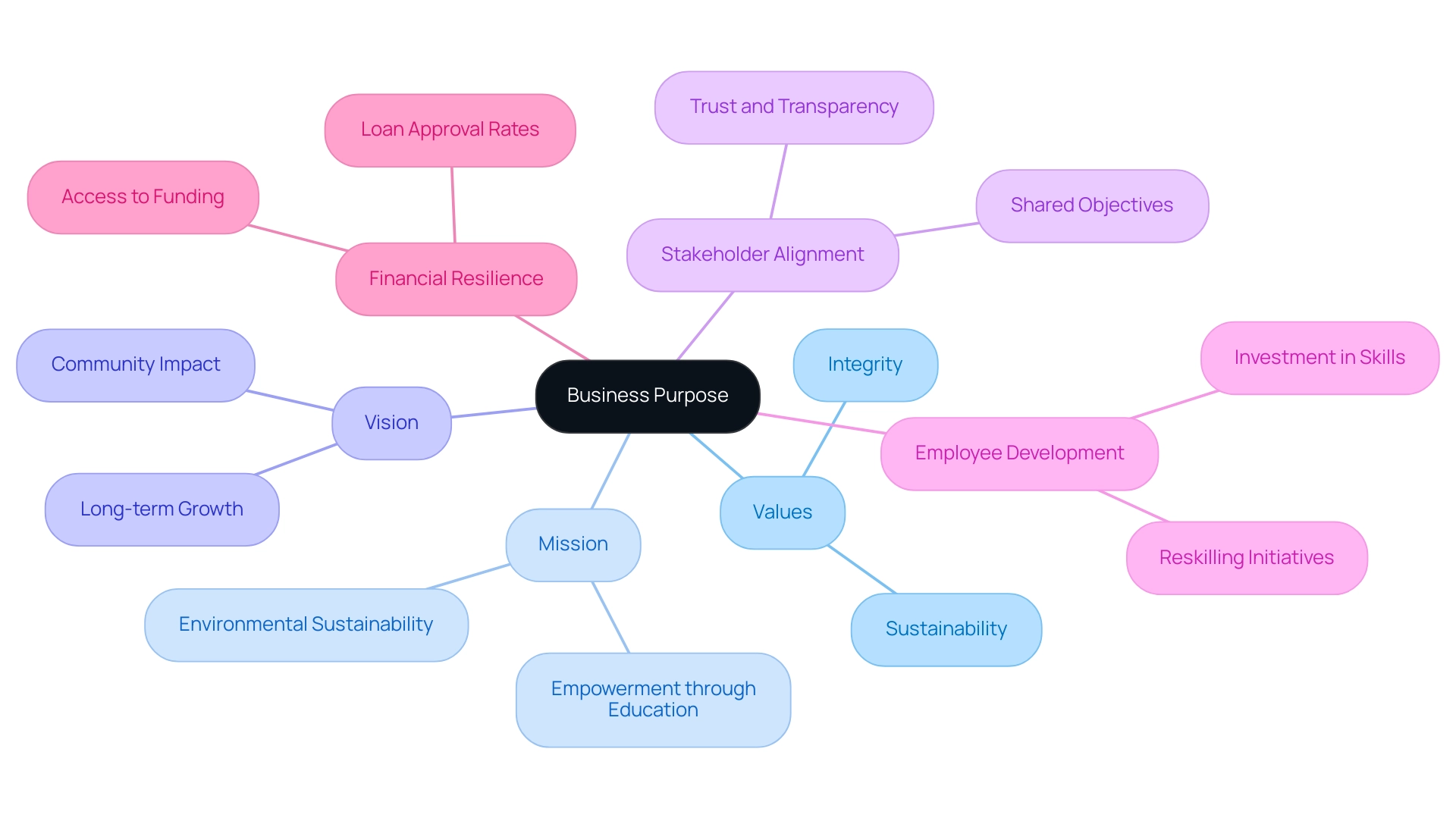
The Multifaceted Role of Business Purpose in Driving Engagement and Loyalty
A clearly defined business purpose is essential for nurturing both staff engagement and customer loyalty. We understand that when individuals perceive their work as meaningful, they are significantly more engaged and committed to their organizations. For instance, a study from Northwestern University reveals that organizations with a strong sense of mission enjoy higher staff satisfaction and retention rates.
This sense of purpose not only motivates employees but also cultivates a culture of loyalty and commitment. Engaged employees are 15% more likely to go above and beyond their coworkers, showcasing the tangible benefits of a meaningful work environment.
On the customer side, there’s a growing trend of consumers gravitating toward brands that align with their values. Purpose-driven companies, such as TOMS, embody this shift by integrating social responsibility into their business purpose and operations. TOMS has successfully built a loyal customer base by demonstrating commitment to a greater cause, which not only enhances customer loyalty but also encourages repeat business and referrals.
In fact, research indicates that brands with a clear business purpose experience higher customer loyalty, with projections for 2025 suggesting that 70% of consumers are more inclined to support brands that resonate with their personal values.
Moreover, the impact of business goals extends to staff engagement metrics. Research conducted in 2025 shows that organizations with a defined business purpose see a 15% increase in staff engagement levels compared to those without. Additionally, Gallup highlights that “engagement can decrease absenteeism by 81%”, underscoring the necessity of fostering an engaged workforce.
The case study on wellness programs illustrates this point, as organizations that implement comprehensive wellness initiatives can expect significant improvements in staff engagement and a guaranteed return on investment. Furthermore, the statistic indicating that only 52% of employees feel their career development aspirations are being met emphasizes the need for aligning organizational goals with employee growth.
As organizations increasingly recognize the vital link between intent and performance, the movement toward a purpose-driven strategy will likely shape the future of organizational success. You are not alone in this journey; together, we can foster environments where both employees and customers thrive.
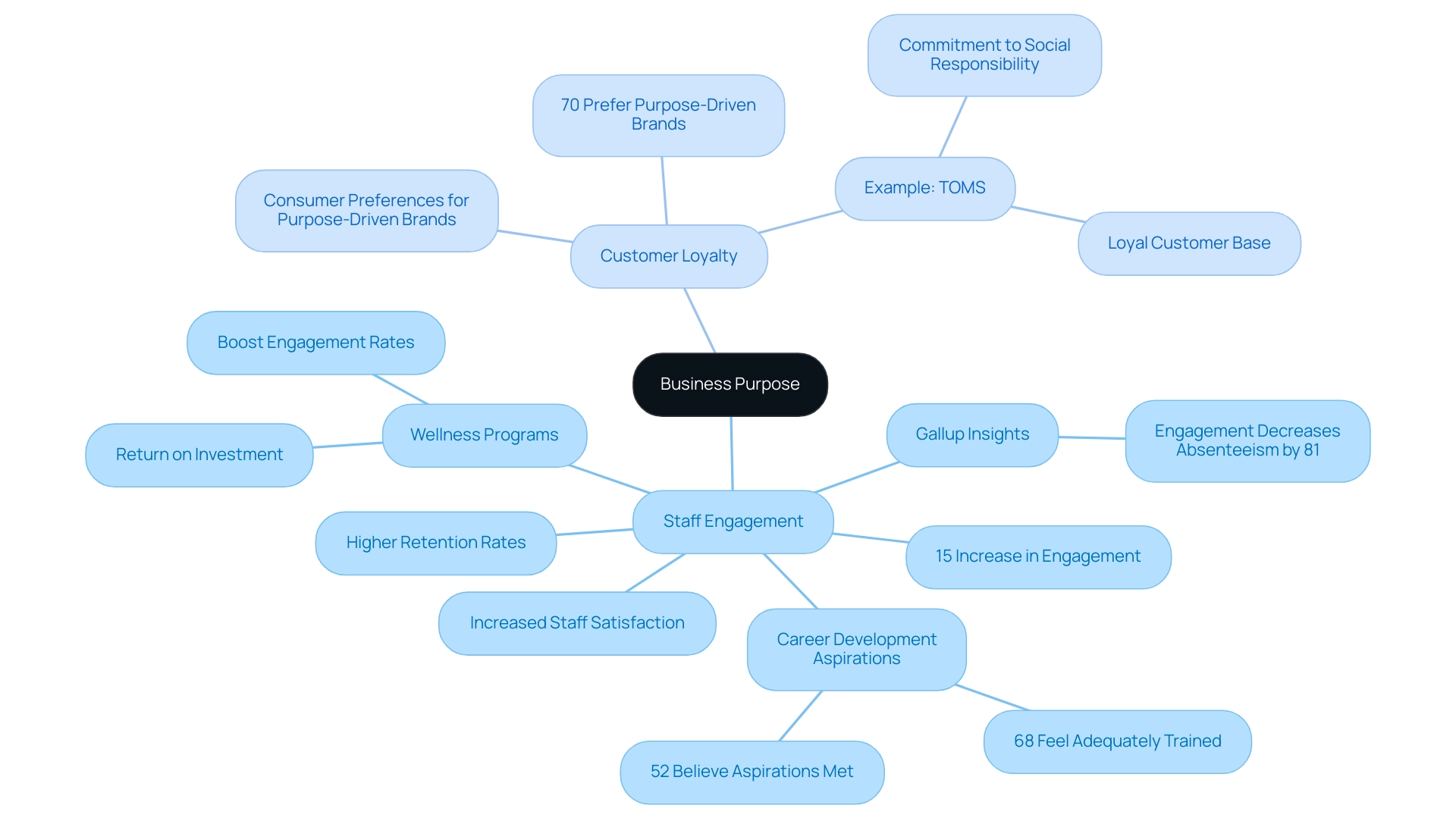
Aligning Business Objectives with Purpose: A Pathway to Enhanced Performance
Aligning organizational goals with a clear intention is not just a strategy; it’s a vital step toward enhancing performance metrics in 2025. We understand that when businesses ensure their strategic goals resonate with their core mission, they create a cohesive framework that guides decision-making and resource allocation. For instance, a company devoted to sustainability may set objectives that prioritize eco-friendly practices and products. This not only streamlines operations but also enhances accountability and transparency, fostering a sense of purpose.
Organizations that successfully weave intent into their strategies experience remarkable benefits. Take Unilever, for example. By aligning its objectives with its commitment to sustainability, Unilever has seen improvements in both financial performance and market competitiveness. This highlights the tangible advantages of strategies driven by a genuine business purpose.
Have you ever considered how purpose-driven objectives can transform your workplace? Statistics show that companies embracing this approach experience a stunning 75% increase in employee engagement. This boost is often linked to consistent feedback mechanisms and a clear alignment of goals. Furthermore, organizations utilizing data-focused performance management are 1.5 times more likely to surpass rivals across key metrics. This underscores the importance of integrating intent into strategy. With the performance management software sector projected to reach $12.17 billion by 2032, it’s clear that effective tools are becoming increasingly essential.
Looking ahead, the Asia-Pacific region is expected to witness the fastest growth rate of 12.2%. This suggests a regional shift toward aligning goals with performance. Experts emphasize that this alignment fosters a culture of innovation and adaptability—qualities essential for thriving in today’s dynamic corporate landscape. By embracing intent within their core strategies, companies not only enhance their operational effectiveness but also position themselves for long-term success in an increasingly competitive environment.
Consider the case study titled “Benefits of Data-Driven Performance Management.” It illustrates how entities effectively utilizing data analytics in their performance processes become 1.5 times more likely to outperform rivals across key business metrics. This reinforces the argument for incorporating intent into business strategies. You are not alone in this journey; many organizations are discovering the profound impact of aligning their goals with a greater purpose.
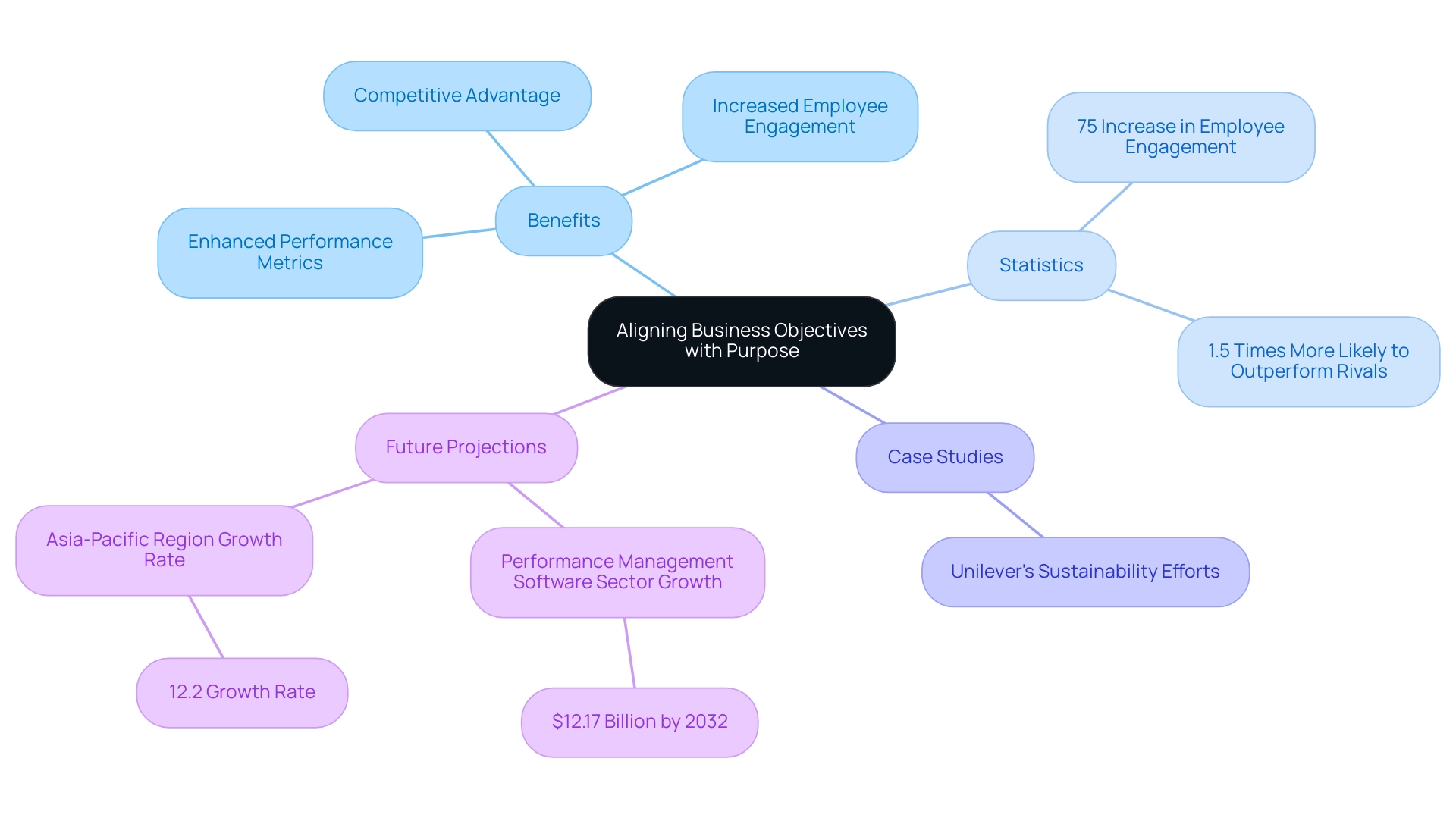
Embedding Purpose into Corporate Culture: Building a Positive Work Environment
Embedding a business purpose into corporate culture is essential for nurturing a positive work environment. This not only attracts top talent but also helps retain them, especially during career transitions in a changing economy. A purpose-driven culture fosters a sense of belonging among staff, motivating them to contribute meaningfully while empowering them to take control of their career paths. We understand that research indicates two-thirds of workers are not engaged at work, with 22% experiencing daily sadness. This highlights the urgent need for a culture that supports job readiness and personal agency aligned with the business purpose.
Consider companies like Google and Zappos. They illustrate how a strong corporate culture, focused on mission, can lead to exceptional employee satisfaction and remarkably low turnover rates. Furthermore, organizations that embrace diversity and equity cultivate an engaged workforce, fostering creativity and innovation. This is particularly vital for those seeking to build transferable skills and navigate career challenges, especially in a declining job market where age-related limitations can hinder opportunities.
By integrating purpose into daily practices, organizations can create an atmosphere of trust, collaboration, and innovation. This alignment between corporate values and staff engagement serves a business purpose by enhancing morale and significantly boosting productivity. In fact, studies show that individuals in purpose-driven environments report a 50% increase in job satisfaction and a 40% increase in productivity.
Additionally, 96% of staff report having a positive company culture due to volunteering, which aligns with the theme of community engagement and worker satisfaction.
A notable example is the Lemonade Giveback Initiative, where the insurance company Lemonade donates unclaimed premiums to nonprofits chosen by its customers. This initiative has led to more than $1.8 million contributed to various charities. It demonstrates how integrating social values into corporate culture can connect with staff and strengthen their dedication to the company. As Ford’s VP stated, “95% of our carbon emissions today come from our vehicles, operations, and suppliers, and we’re tackling all three areas with urgency and optimism.” This reflects the importance of corporate responsibility in fostering a purpose-driven culture.
As we approach 2025, the significance of integrating intent into corporate culture for a business purpose will only increase. Experts highlight that companies focusing on intent will pave the way for staff satisfaction and overall achievement. Companies embracing this approach are not just creating a positive work environment; they are setting the stage for sustainable growth and innovation. This is essential for career transitioners seeking fulfilling professional paths and financial freedom. Moreover, by concentrating on transferable skills, organizations can better prepare employees to adapt to the evolving job landscape.
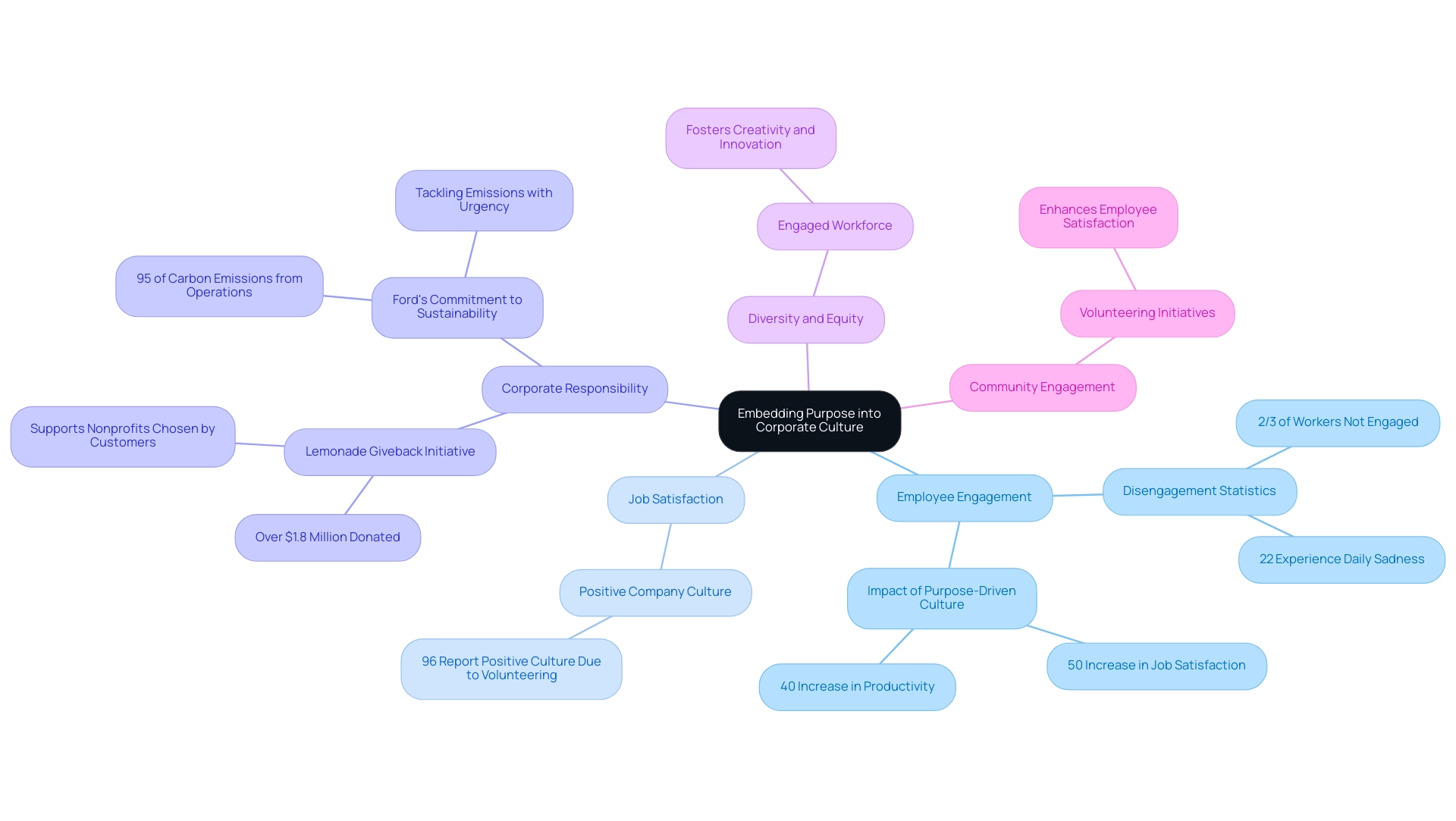
Leadership’s Role in Championing Business Purpose: Sustaining Commitment and Direction
Leadership plays a vital role in advocating for the business purpose and weaving it into the very fabric of a company. Effective leaders not only communicate objectives with clarity but also embody them through their actions and decisions. This authenticity nurtures trust and inspires employees to align their efforts with the organization’s overarching goals.
Consider Starbucks, which exemplifies this commitment through its dedication to ethical sourcing and community engagement, reinforcing its core mission.
In today’s rapidly changing economy, it’s crucial to understand how long one will remain employable and the limitations of conventional career paths. As career transitioners navigate these challenges, they must reflect on their transferable skills and the potential for financial independence. Did you know that when leaders effectively manage their teams and recognize individual strengths, profits can soar by as much as 29%?
However, a significant challenge persists: 59% of managers overseeing small teams have never received formal leadership training. This gap underscores the urgent need for leaders to develop skills that not only promote a strong business purpose but also empower their teams to take charge of their career destinies.
Moreover, research shows that recognizing performance is essential for retaining staff. In fact, 73% of workers in Germany, Austria, and Switzerland identify it as a key factor in maintaining engagement. Companies that prioritize recognition and fair treatment are more likely to foster a positive work environment and retain talent. The case study titled “The Importance of Recognition in Employee Retention” highlights this point, revealing that organizations actively recognizing their employees’ contributions are more successful in keeping them engaged and committed.
As we approach 2025, the influence of leadership on organizational dedication to mission will grow increasingly significant. Leaders must embrace strategies that champion their business purpose by actively listening to their teams and integrating feedback into their leadership practices. According to a report by the Chief Learning Officer, 63% of companies employ listening methods to enhance leaders’ coaching skills, which positively influences employee engagement, communication, and strategic planning.
By doing so, they can cultivate a culture where authentic leadership flourishes, ultimately driving long-term success and commitment to the mission.
The Entrepreneur’s Source beautifully illustrates this approach through its comprehensive and personalized Career Ownership Coaching™ services, empowering individuals to navigate their career transitions with confidence. By offering no-cost coaching and a structured process, The Entrepreneur’s Source helps clients align their career goals with their personal values, highlighting the importance of leadership in fostering a purposeful and fulfilling professional journey. This empowerment is vital for those seeking to mitigate risks and fast-track their new careers while exploring new possibilities beyond their current experiences.
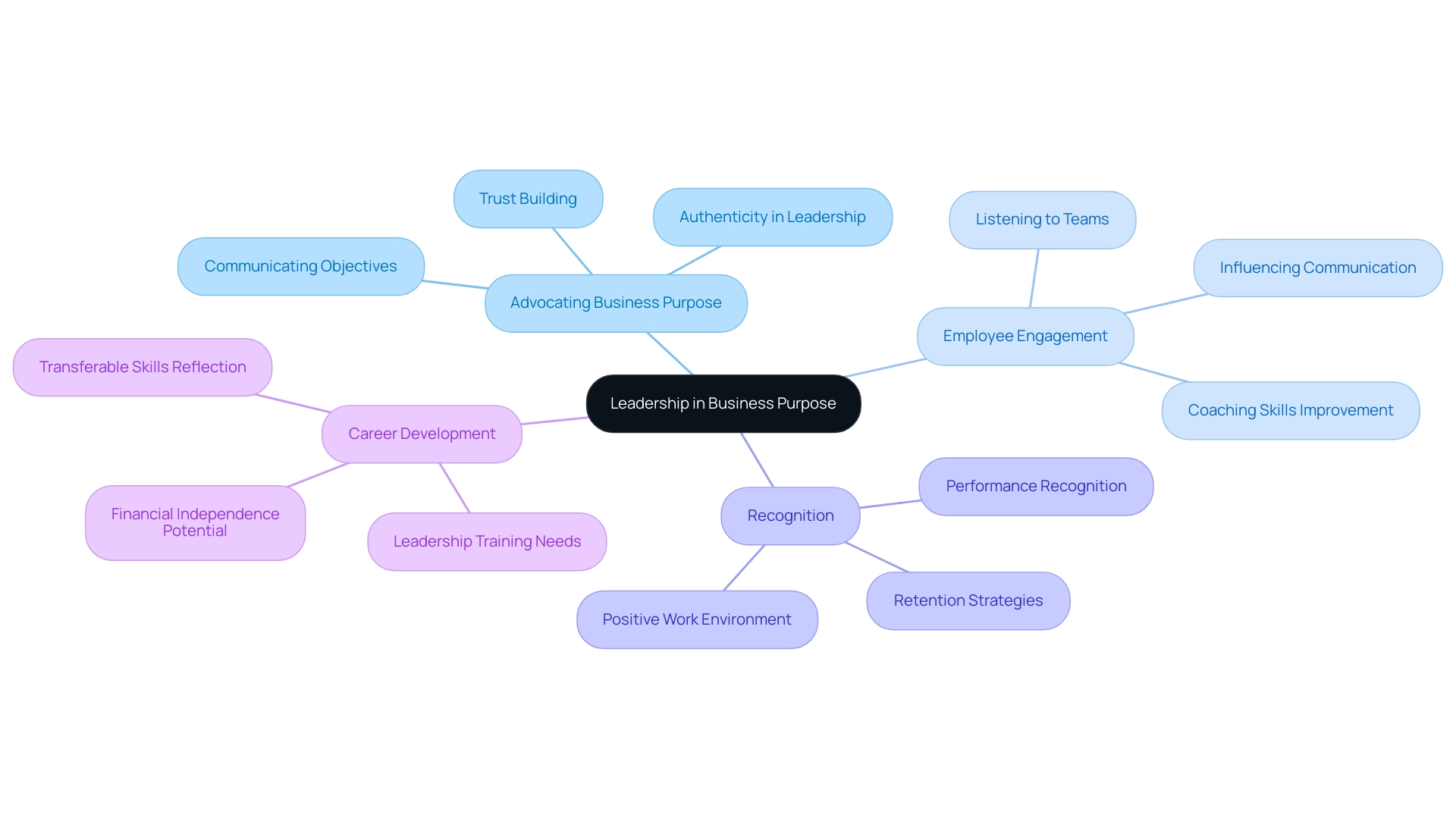
Measuring Success: The Financial and Competitive Benefits of a Strong Business Purpose
In today’s dynamic marketplace, we understand that navigating the complexities of business can feel overwhelming. The financial and competitive benefits of a strong business objective are becoming increasingly clear. Research shows that purpose-driven companies significantly outperform their competitors in financial performance and market share. For instance, a recent Deloitte study revealed that businesses with a clear mission not only foster greater levels of staff involvement but also see a direct link to enhanced productivity and profitability.
You are not alone in facing these challenges. Companies motivated by a clear mission report 30% higher levels of innovation, demonstrating how a defined goal can inspire creative solutions and foster growth.
Moreover, mission-driven entities frequently enjoy improved brand loyalty and customer satisfaction, which leads to higher sales and a stronger competitive stance. As financial analysts note, the shift towards value-seeking behavior among consumers—evident with two-thirds of respondents indicating a preference for lower-cost options—highlights the necessity for companies to effectively emphasize their value propositions. Ira Kalish, chief economist, points out that understanding where to direct innovation is crucial in this context.
Authenticity plays a vital role in this equation. Michael Chavez emphasizes that companies must avoid creating mission statements that are merely buzzwords; instead, they should focus on authentic, actionable goals that resonate with both staff and clients. This genuine approach fosters a culture that values significance, leading to meaningful employee experiences and a more engaged workforce.
For those transitioning in their careers, the importance of empowerment and adaptability cannot be overstated. The Entrepreneur’s Source exemplifies this by providing personalized coaching and no-cost services, empowering individuals to take control of their career transitions. By assessing these results, entities can clearly showcase the tangible worth of their dedication to a robust business purpose, ultimately positioning themselves for sustained success in an increasingly competitive environment.
This focus on personal agency and community engagement is essential for navigating the challenges of a declining job market and achieving financial freedom. Remember, you are not alone on this journey; together, we can explore the path to your career ownership.
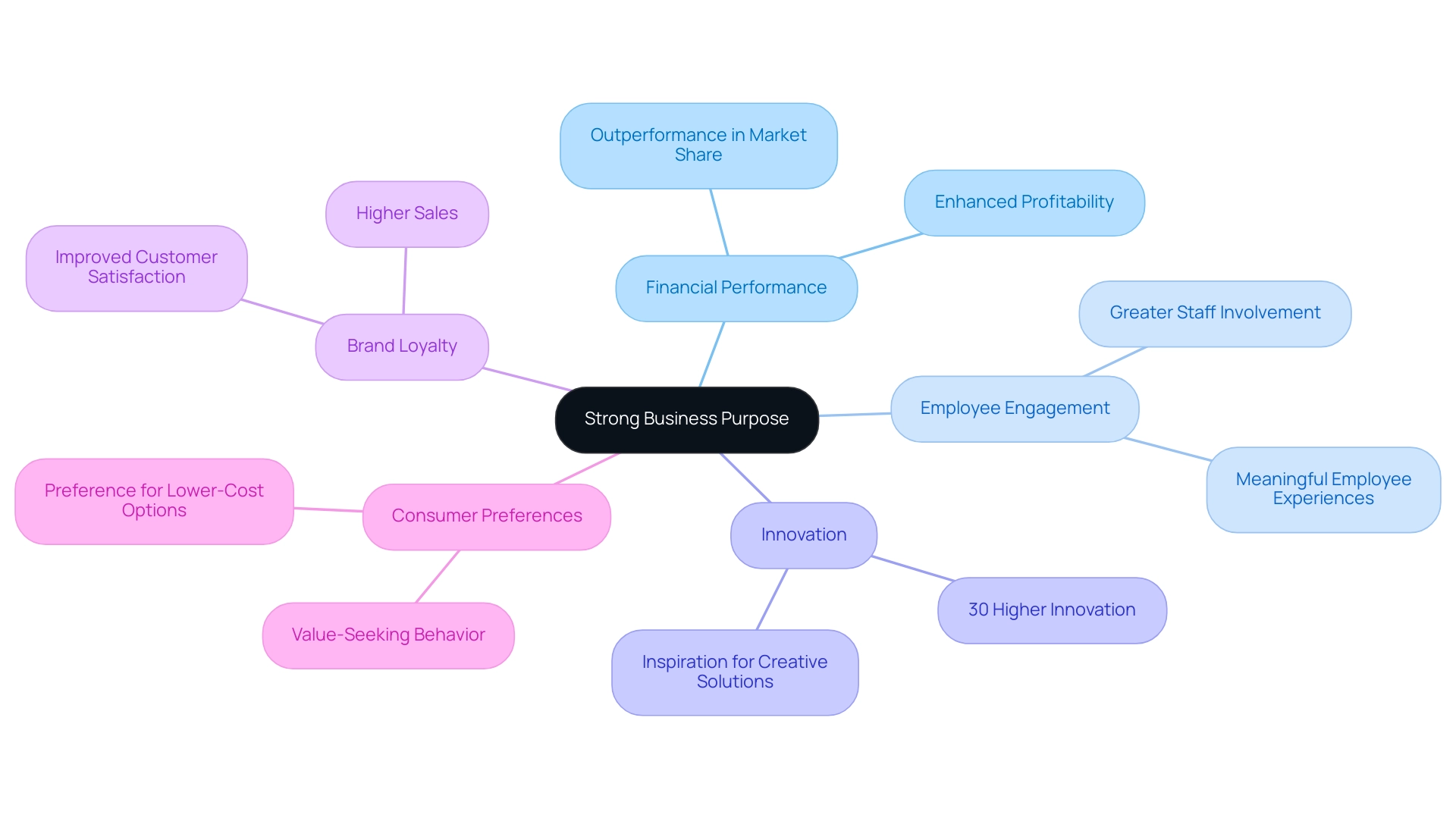
Overcoming Challenges in Implementing a Purpose-Driven Approach: Strategies for Success
Implementing an approach driven by business purpose can be challenging for many companies. We understand that resistance from stakeholders who prioritize immediate financial returns over the business purpose can hinder progress. Furthermore, aligning diverse teams around a shared vision often proves complex, as differing priorities and perspectives can create friction.
Have you ever felt that your time is being wasted in meetings? Statistics indicate that a significant number of entities struggle with these issues, with many professionals reporting that 71% lose valuable time each week due to ineffective meetings stemming from unclear objectives.
To effectively navigate these challenges, organizations should prioritize clear communication and stakeholder engagement for their business purpose. Continuous education about the benefits of a purpose-driven approach is essential in fostering understanding and buy-in. As Parnell Woodard, a Career Ownership Coach at Find Your Career 2.0, emphasizes, “The Entrepreneur’s Source focuses on providing Career Ownership Coaching™ to individuals seeking to explore new professional opportunities.” This highlights the importance of guiding individuals through transitions with a clear business purpose, especially for those affected by the Battered Career Syndrome and Investor Syndrome, who seek to take control of their career paths through business ownership.
Consider the inspiring case of Ben & Jerry’s. The company has successfully implemented purpose-driven initiatives by promoting open dialogue and actively involving staff in these efforts. This inclusive approach not only boosts commitment but also enables staff to contribute meaningfully to the mission.
Moreover, organizations can leverage data-driven performance management to measure and enhance employee contributions effectively. Companies utilizing data analytics in performance processes are 1.5 times more likely to outperform competitors across key metrics. Additionally, those with robust performance management practices are 4.2 times more likely to see improved outcomes, experience 30% revenue growth, and enjoy reduced attrition rates.
By adopting these strategies, organizations can cultivate a more cohesive and dedicated workforce, ultimately leading to improved performance and alignment with their core mission. You are not alone in this journey; we can support you in achieving financial freedom and personal agency.
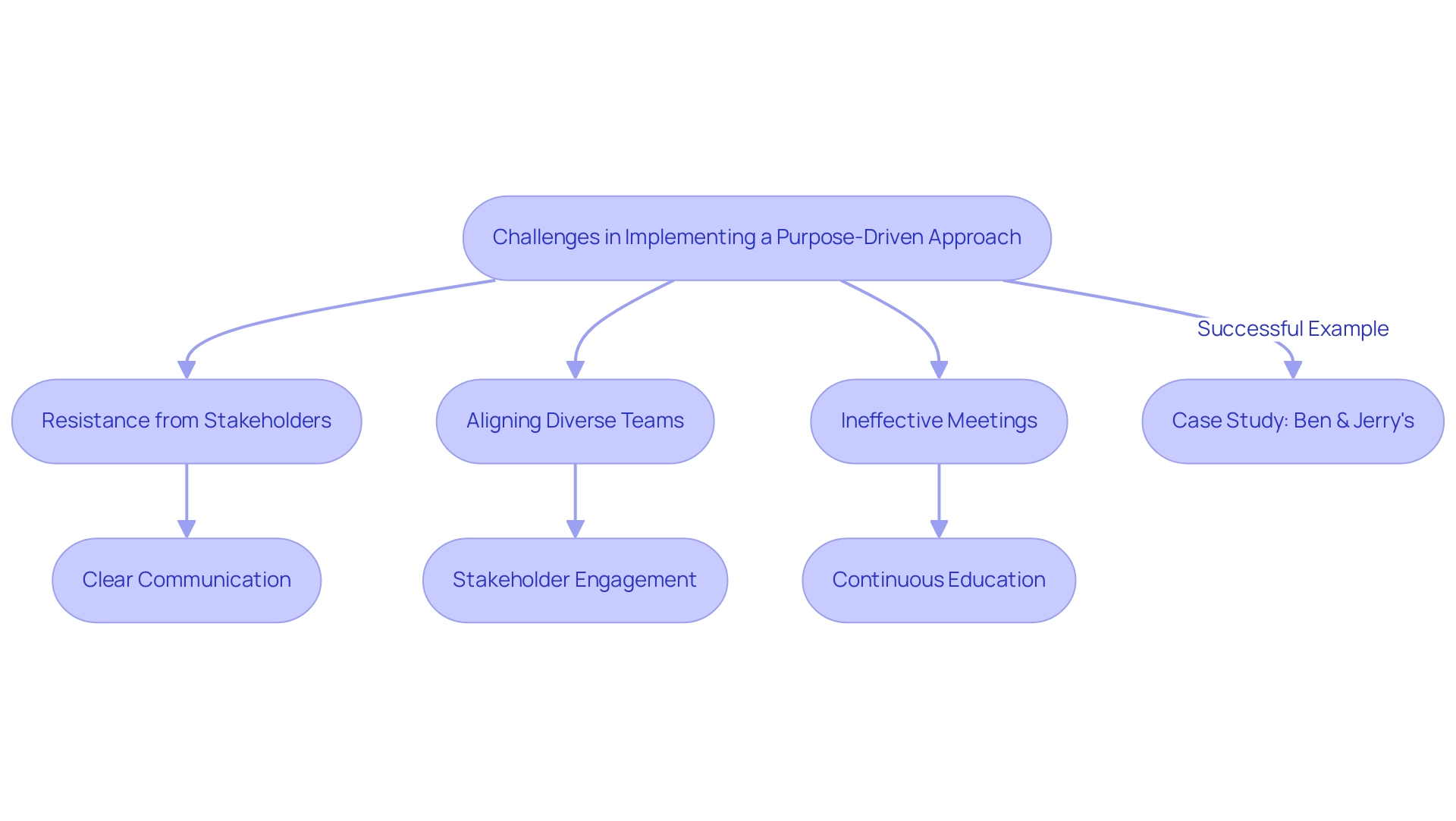
Future Trends in Business Purpose: Embracing Sustainability and Social Responsibility
As societal expectations evolve, the future of purpose in enterprises increasingly highlights sustainability and social responsibility. Organizations are beginning to understand that their long-term success is deeply intertwined with their impact on the environment and society. Have you ever felt uncertain about your career path? Find Your Career 2.0 exemplifies this shift by offering Career Ownership Coaching™, empowering individuals to take charge of their professional futures, especially those grappling with career uncertainties like layoffs or job dissatisfaction.
This nurturing approach not only fosters personal growth but also aligns with the rising consumer demand for ethical practices. In fact, statistics reveal that 68% of consumers actively strive to eliminate waste in all areas of their lives, showcasing a significant shift toward ethical consumption. This change in consumer behavior encourages companies to adopt purpose-driven practices that resonate with their values. Consequently, organizations prioritizing sustainability are not just responding to market demands; they are positioning themselves as leaders in their fields.
Looking ahead to 2025, the focus on sustainability and social responsibility will persist in shaping organizational strategies. The Corporate Sustainability Reporting Directive (CSRD) is intensifying pressure on European companies to communicate their corporate social responsibility (CSR) activities effectively and authentically. This trend underscores the critical importance of transparency and accountability in building consumer trust.
Moreover, industry leaders recognize that the evolving role of purpose in commercial practices is essential. According to PWC, “81% of executives report sustainability documentation as one of their top three challenges,” highlighting the obstacles organizations face in adopting sustainable practices. As organizations navigate this landscape, embracing sustainability will be vital for thriving in an increasingly conscious marketplace, where purpose-driven practices are becoming the norm rather than the exception.
The future of business purpose encompasses not only profit but also the creation of a positive impact on society and the environment, ensuring businesses can succeed while contributing to a better world. In this context, we encourage individuals to leverage their transferable skills and community connections to navigate career challenges. You are not alone in this journey; Find Your Career 2.0 is dedicated to helping individuals overcome the limitations of conventional career options and achieve financial freedom through tailored coaching and support. Together, we can foster a sense of personal agency and financial independence in a challenging job market.
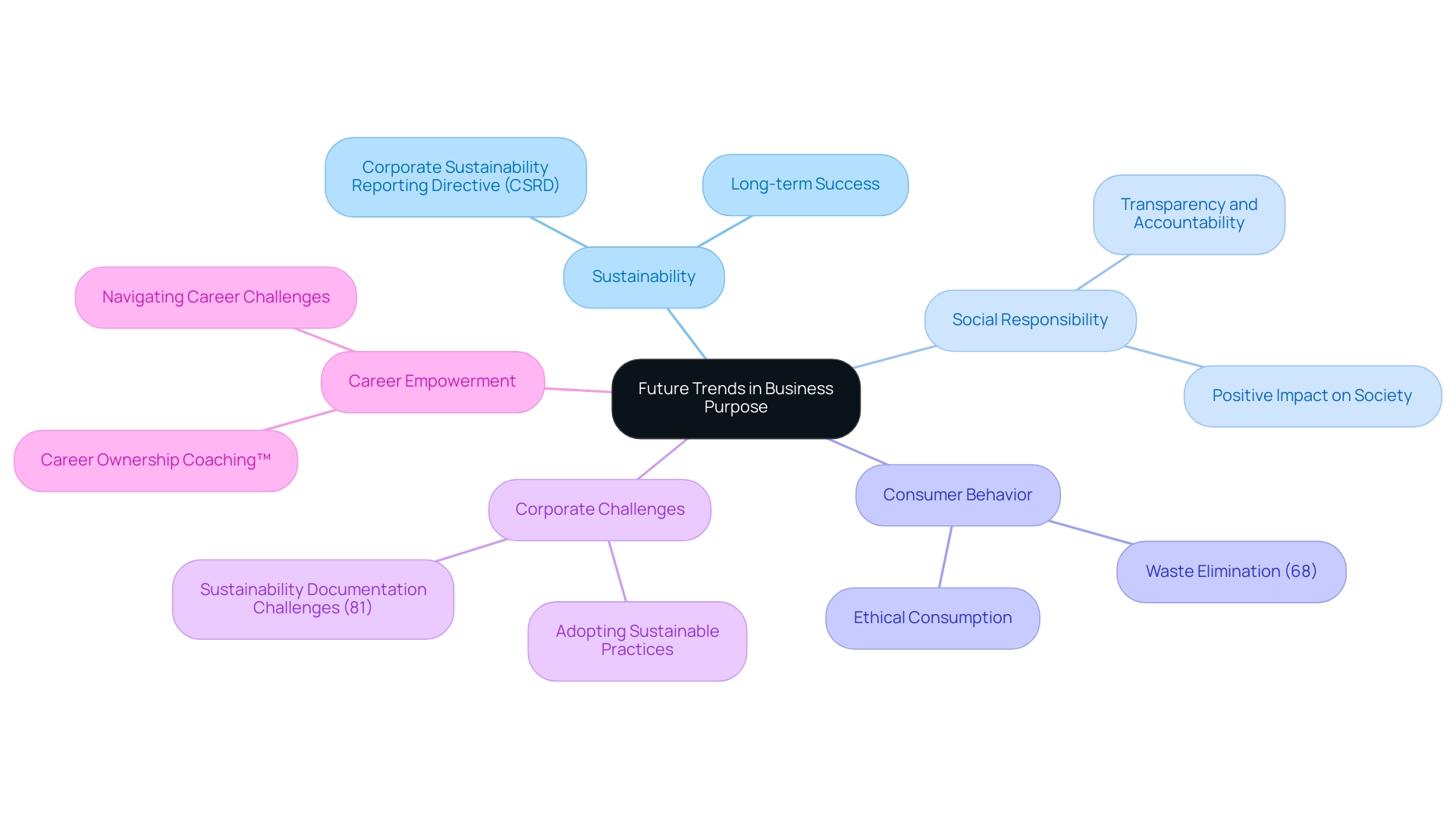
Conclusion
In today’s rapidly evolving corporate landscape, a clearly defined business purpose is not just a trend; it is a fundamental element of organizational success. This purpose shapes an organization’s identity, aligns stakeholders, and fosters a culture of engagement and loyalty. Companies like Patagonia and TOMS illustrate how a commitment to core values resonates deeply with both employees and consumers, leading to enhanced satisfaction and retention rates.
Have you ever considered how aligning business objectives with purpose can elevate performance metrics? Organizations that prioritize sustainability and social responsibility are not merely responding to consumer demand; they are positioning themselves competitively in the market. The financial benefits of a strong purpose are clear: purpose-driven companies report higher levels of innovation, employee engagement, and overall profitability.
As we look to the future, integrating purpose into corporate culture will be essential for attracting and retaining talent, especially for those navigating career transitions in a changing economy. Leadership plays a vital role in championing this purpose, ensuring that it is authentically communicated and embodied across all levels of the organization.
The path toward sustainable growth and innovation lies in embracing a purpose-driven approach. By focusing on their core mission and values, organizations can create a positive impact on society and the environment while achieving long-term success. As the business landscape continues to evolve, those who prioritize purpose will not only thrive but also contribute to a better world. Remember, you are not alone in this journey; together, we can foster a more meaningful and impactful corporate environment.
Frequently Asked Questions
What is the business purpose of a company?
The business purpose is the heartfelt reason a company exists beyond merely pursuing profit. It encompasses the values, mission, and vision that guide the company’s operations and strategic decisions.
Why is having a clear business purpose important as we approach 2025?
A clear business purpose shapes the identity of the organization and unites stakeholders—including staff, customers, and investors—toward shared objectives, which is essential for success.
Can you provide an example of a company with a strong business purpose?
Patagonia is an example of a company that has integrated environmental sustainability into its primary mission, which resonates with its clientele and enhances organizational effectiveness.
How does a strong business purpose impact employee engagement?
A clearly defined business purpose nurtures staff engagement by making work feel meaningful, leading to higher satisfaction and retention rates. Engaged employees are also more likely to exceed performance expectations.
What trends are emerging regarding consumer behavior and business purpose?
Consumers are increasingly gravitating toward brands that align with their values. Research indicates that by 2025, 70% of consumers will be more inclined to support brands that resonate with their personal values.
What is the relationship between business purpose and employee development?
Companies that articulate their business purpose can encourage investment in employee development, promoting a culture of ongoing enhancement and addressing the skills gap projected for the future workforce.
How does a defined business purpose affect staff engagement metrics?
Organizations with a defined business purpose see a 15% increase in staff engagement levels compared to those without, and fostering engagement can significantly reduce absenteeism.
What role does a strong business mission play in organizational adaptability?
Businesses with a distinct objective are better equipped to handle challenges and adapt to evolving market conditions, as demonstrated by the rise of telehealth services during the pandemic.
How can financing options assist small enterprises in achieving their goals?
Financing alternatives provided by the U.S. Small Business Administration can help small enterprises enhance their resilience and capacity for growth, supporting them in reaching their specified goals.
What are the benefits of implementing wellness programs in organizations?
Organizations that implement comprehensive wellness initiatives can expect significant improvements in staff engagement and a guaranteed return on investment.


